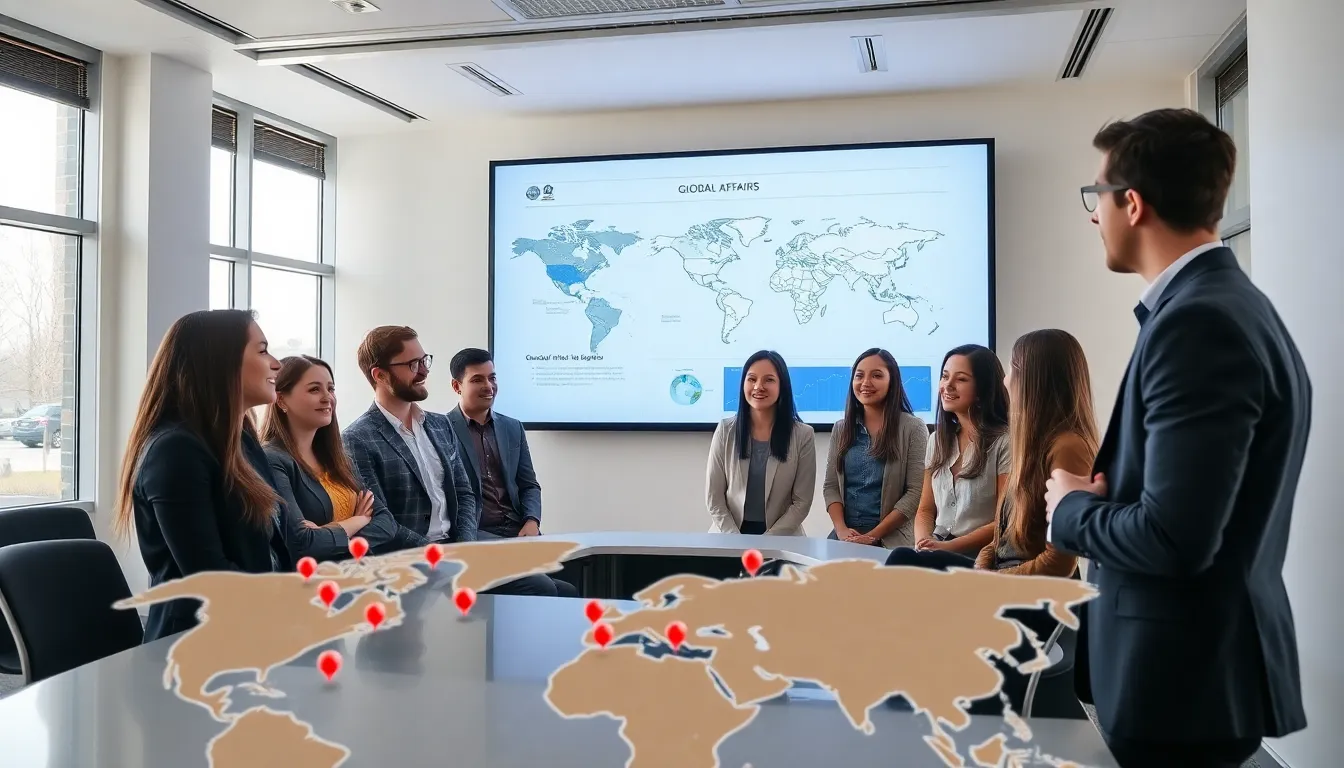Are you ready to jump into the intriguing realm of global affairs? Imagine chasing international diplomacy, analyzing global trends, and crafting solutions to some of the world’s most pressing challenges. A Master’s in Global Affairs lets you do just that. This degree offers more than just a fancy title: it opens doors to exciting careers and an in-depth understanding of how our world tick. Buckle up as we explore everything you need to know about this transformative educational journey, from curriculum details to career outcomes. Spoiler alert: it’s going to be both enlightening and, dare we say, a little fun.
Table of Contents
ToggleWhat Is a Master’s in Global Affairs?

A Master’s in Global Affairs is designed for those who aspire to understand and influence the global stage. This interdisciplinary degree covers a range of subjects, including international relations, economics, political science, and cultural studies. Students learn to analyze complex issues that cross borders, such as climate change, human rights, and economic development.
Typically, programs are structured to provide both theoretical frameworks and practical skills. Students are not only taught to recognize global issues but also equipped with tools for diplomacy, conflict resolution, and policy-making. The goal? To foster leaders ready to tackle world issues head-on. Whether they want to work in government, NGOs, or multinational corporations, graduates emerge with a unique skill set tailor-made for global engagement.
Core Curriculum and Specializations
Enrolling in a Master’s in Global Affairs program usually means diving deep into a rich curriculum. Core courses often include topics like International Relations Theory, Global Governance, and Comparative Politics. This foundational knowledge equips students with a broad understanding of global systems.
After the basics, many universities offer specializations allowing students to tailor their education. Interested in sustainable development? Pursuing a specialization in Environmental Policy could be perfect. More fascinated by humanitarian issues? A focus on Human Rights might be the way to go. Other common specializations include:
- Security Studies – Focus on issues like terrorism and national defense.
- International Trade – Investigate into economic relations and trade policies.
- Conflict Resolution – Learn mediation and negotiation techniques.
Specializations help students hone their interests, making them more marketable in specialized job sectors.
Career Opportunities with a Global Affairs Master’s
The career opportunities for graduates holding a Master’s in Global Affairs are vast and varied. With a degree so versatile, one might find themselves working in politics, civil service, or international organizations. Job roles include:
- Foreign Affairs Analyst – Conduct research and provide insights on international trends.
- NGO Program Manager – Oversee projects aimed at global issues like poverty or education.
- Diplomat – Represent one’s country abroad, engaging in policy discussions.
- International Consultant – Advise businesses on entering global markets.
Besides traditional pathways, entrepreneurial opportunities abound. Many graduates leverage their expertise to start their own organizations or consultancies focusing on global issues. A Master’s degree can serve as a strong catalyst for anyone wishing to make a positive impact worldwide.
Top Universities Offering Global Affairs Programs
Choosing where to pursue a Master’s in Global Affairs can feel daunting, but several prestigious institutions consistently stand out:
- Columbia University – Known for its robust curriculum and location in New York City, offering unparalleled networking opportunities.
- Georgetown University – Renowned for a strong focus on international relations and diplomacy, linking students with key policymakers.
- Johns Hopkins University – Offers a unique blend of theory and practical application through its School of Advanced International Studies.
- Tufts University – Known for its interdisciplinary approach, combining insights from various fields to address global issues.
These universities not only provide an excellent education but also abundant networking opportunities, connecting students with industry leaders and current practitioners.
Admission Requirements and Application Process
Getting into a Master’s program in Global Affairs isn’t just about having a good GPA. Most universities require a detailed application process that involves several steps:
- Bachelor’s Degree – A relevant undergraduate degree in political science, international relations, or related fields is generally preferred.
- Personal Statement – This essay should capture the applicant’s passion for global issues and demonstrate their commitment.
- Letters of Recommendation – Typically, candidates need two or three strong recommendations from professionals or academics who can speak to their abilities.
- GRE Scores – Some institutions may require Graduate Record Examination scores, although this is gradually becoming less common.
Timing is essential: applicants should begin the process early to ensure they meet all deadlines, especially if applying for financial aid.
Value and Impact of a Global Affairs Master’s Degree
A Master’s in Global Affairs carries immense value in today’s interconnected world. Graduates find themselves well-prepared to address crucial global challenges, influencing policy and promoting sustainable practices. The degree cultivates critical thinking, analytical skills, and cultural awareness, essential competencies in a variety of sectors.
Also, satisfying a personal ambition to understand complex world dynamics provides intrinsic value. This journey enhances one’s ability to communicate effectively across cultures and frameworks. Individuals not only grow professionally but also personally, becoming more informed and engaged global citizens capable of making significant impacts.




